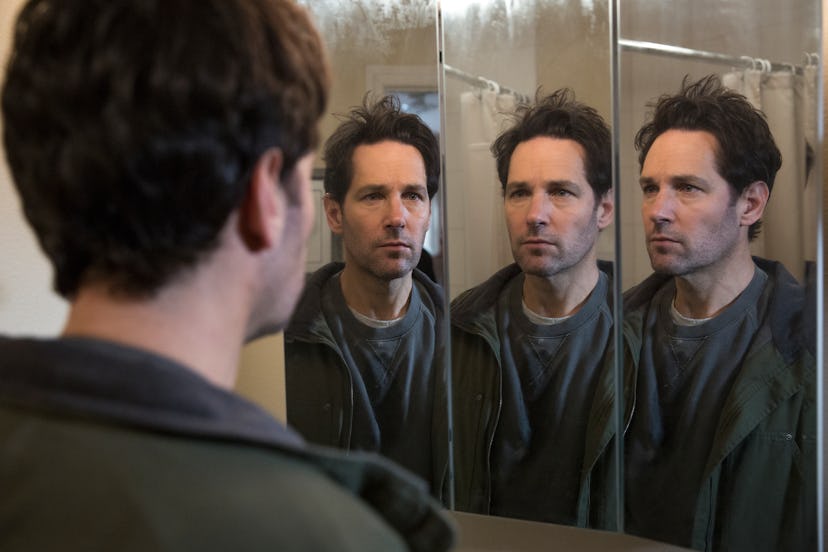In Living With Yourself, Paul Rudd Is Literally His Own Worst Enemy

Have you ever wished you could just be someone else? Or at least a better version of the person you are now?
In Living With Yourself, Paul Rudd plays not just one but two leading roles—Miles, a frustrated, frumpy, down-on-his-luck suburbanite; and Miles, a chipper, diligent, good husband and employee at the top of his game. Technically, they’re the same, but they also couldn’t be more different. When Miles receives a recommendation from a colleague for a $50,000 state-of-the-art spa treatment that provides a full mental reset, he’s willing to do anything to become a better version of himself. Only he learns the hard way that it’s not just a reset.
Miles discovers that the treatment is actually an experiment in human cloning, and he was never supposed to wake up after the new Miles takes his place. They look exactly the same and have all of the same memories, but New Miles is sharper, wittier, more charming, and even appears to be in better shape. Old Miles must contend with his clone, and learn what it means to truly live with himself—a tension that most of us grapple with figuratively but not literally.
LIVING WITH YOURSELF
The narrative shifts perspective between Old Miles and New Miles, with each episode ending in cliffhanger. But while the series might seem deliberately designed for binge watching, Living With Yourself creator and show runner Timothy Greenberg doesn’t imagine that Netflix‘s latest entry into the existential comedy series canon will be watched in one sitting. “What’s the difference between having a cliffhanger that just makes you want to watch the next episode in binge format, or wanting to come back to it next week?” Greenberg posited. “I think it’s actually kind of similar. Certainly my preferred viewing would’ve been binging, it’s just that I don’t think most normal human beings watch eight episodes in a row.”
Living With Yourself is Greenberg’s first foray into writing and creating his own television series. For years, he worked as a producer on The Daily Show with Jon Stewart, mostly on the “man on the street” segments. When Stewart left the news comedy series, Greenberg found himself at a career standstill. “I panicked and thought, Oh god, what am I doing with my career?” he remembers. The concept of what would become his television series came to him in the shower.
“I thought I was going to be an independent filmmaker,” Greenberg said. “I had this idea for a film, and I actually stood in the shower and thought about how you could break it out over the course of a season, which I really prefer. That was February of 2015, and within a few months I’d written the first few episodes and a 70-page bible, and then took that out and absolutely zero people I took it out to actually read that 70-page bible. But it was good for me, just to know how the story was going to go.”
Timothy Greenberg on set of *Living With Yourself*.
The show was accepted by IFC, then eventually passed on after the network experienced some trouble financing the project. Greenberg’s mother passed away shortly after that, while he was looking for a home for his show. “I’m laughing about it now,” he said, “But it was a really dark period.” He shopped the series around and Netflix took the bait. The next question: who would play Miles?
“Paul Rudd was on our sort of magic, pretend, pie-in-the sky way at the beginning,” Greenberg revealed. “He was a little bit of a fantasy man.” Luckily that fantasy became a reality: Rudd almost immediately signed on for the lead role.
“It’s a cliche to say, we are our own worst enemy,” Greenberg said, but that central problem is indeed the main tension of Living With Yourself. For Greenberg, the cliche runs true. “It’s happening right now,” he said. “Everything is great. I have a new show premiering, it’s wonderful. But even so, there are times that I’m feeling not my best self, and I wonder, What the hell is it going to take? That battle to be able to appreciate things is ongoing, no matter where you are.”
Existential ennui, he points out, is particularly universal these days. “I’m not a millennial by any means so I don’t know, but what I’ve heard from some people who watched the show is that it seems to be something going on with the millennial generation or Gen-Z, some kind of society-wide ennui,” he said. “What am I doing with my life? What’s the point of all this?”
Related: Get 2 Paul Rudds for the Price of One in Netflix’s New Series Living With Yourself